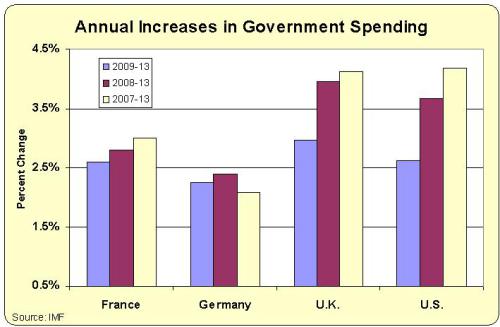There’s an ongoing debate about Keynesian economics, stimulus spending, and various versions of fiscal austerity, and regular readers know I do everything possible to explain that you can promote added prosperity by reducing the burden of government spending.
Simply stated, we get more jobs, output, and growth when resources are allocated by competitive markets. But when resources are allocated by political forces, cronyism and pork cause inefficiency and waste.
That’s why statist nations languish and market-oriented countries flourish.
Paul Krugman has a different perspective on these issues, which is hardly a revelation. But I am surprised that he oftentimes doesn’t get the numbers quite right when he delves into specific case studies.
He claimed that spending cuts caused an Estonian economic downturn in 2008, but the government’s budget actually skyrocketed by 18 percent that year.
He complained about a “government pullback” in the United Kingdom even though the data show that government spending was climbing faster than inflation.
He even claimed that Hollande’s election in France was a revolt against austerity, notwithstanding the fact that the burden of government spending rose during the Sarkozy years.
My colleague Alan Reynolds pointed out that Krugman mischaracterized the supposed austerity in the PIIGS nations such as Portugal, Ireland, Italy, Greece, and Spain.
We have another example to add to the list.
He now wants us to believe that Germany has been a good Keynesian nation.
Here’s some of what Professor Krugman wrote for the New York Times.
I hear people trying to dismiss the overwhelming evidence for large economic damage from fiscal austerity by pointing to Germany: “You say that austerity hurts growth, but the Germans have done a lot of austerity and they’re booming.”Public service announcement: Never, ever make claims about a country’s economic policies (or actually anything about economics) on the basis of what you think you’ve heard people say. Yes, you often hear people talking about austerity, and the Germans are big on praising and demanding austerity. But have they actually imposed a lot of it on themselves? Not so much.
In some sense, I agree with Krugman. I don’t think the Germans have imposed much austerity.
But here’s the problem with his article. We know from the examples above that he’s complained about supposed austerity in places such as the United Kingdom and France, so one would think that the German government must have been more profligate with the public purse.
After all, Krugman wrote they haven’t “imposed a lot of [austerity] on themselves.”
So I followed the advice in Krugman’s “public service announcement.” I didn’t just repeat what people have said. I dug into the data to see what happened to government spending in various nations.
And I know you’ll be shocked to see that Krugman was wrong. The Germans have been more frugal (at least in the sense of increasing spending at the slowest rate) than nations that supposedly are guilty of “spending cuts.”

To ensure that I’m not guilty of cherry-picking the data, I look at three different base years. But it doesn’t matter whether we start before, during, or after the recession. Germany increased spending at the slowest rate.
Moreover, if you look at the IMF data, you’ll see that the Germans also were more frugal than the Swedes, the Belgium, the Dutch, and the Austrians.
So I’m not sure what Krugman is trying to tell us with his chart.
By the way, spending in Switzerland grew at roughly the same rate as it did in Germany. So if Professor Krugman is highlighting Germany as a role model,maybe we can take that as an indirect endorsement of Switzerland’s very good spending cap?
But I won’t hold my breath waiting for that endorsement to become official. After all, Switzerland has reduced the burden of government spending thanks to the spending cap.
Not exactly in line with Krugman’s ideological agenda.

